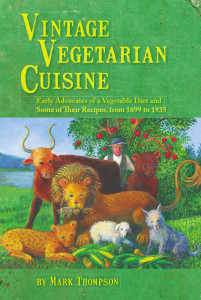CHAPTER 1
Vegetarians Ahead of Their Time
In the spring of 1817, a party of 22 adults and 19 children, led by Rev. William Metcalfe, set sail from Liverpool bound for Philadelphia. Members of a congregation that had formed eight years earlier in Salford, just outside of Manchester, they called themselves Bible Christians.
They distinguished themselves from other denominations most notably by abstaining from alcohol and meat. They were drawn to Pennsylvania by its reputation for religious tolerance, and for the abundant opportunities they expected to find to spread their particular brand of gospel and add to their numbers in America.
The venture had an inauspicious start. It usually took about six weeks to sail from England to the northeastern United States in those days. The Bible Christians heaved and bucked at sea for 11 weeks. Whether it was because of the grim rations on board made worse by their refusal to partake of a shipboard staple, salted beef and cod, stress from such close confinement for so long, or a deeper doctrinal or personality split, the immigrant congregation did not make it to Philadelphia intact. As Metcalfe’s son, Joseph, would recall in a memoir, 23 of the original group of 42 “gave way to indulgences in eating and drinking” en route and left the fold.
The prospects for the remaining faithful did not dramatically improve any time soon. Several of the Bible Christian families set out for Lycoming County, 150 miles northwest of Philadelphia, to try their hand at farming and to open a branch church. Their teachings were greeted with “coldness and indifference” in that part of the state and they drifted away from the faith.
A core group stayed in Philadelphia, where Rev. Metcalfe, who was a scholar in the classics back in England before he became a minister, took in students to help defray church costs. A succession of deadly outbreaks of yellow fever in 1818 and 1819, which caused many families to evacuate the city for extended periods of time, waylaid that venture.
Metcalfe also worked for a while as an editor of the monthly Rural Magazine and Literary Evening Fireside. It folded in 1820. A stable livelihood eluded other church members, as well. “They all suffered more or less from the pinch of poverty,” a church historian later recounted.
The tepid response to their religious teachings in Philadelphia was surely an even bigger disappointment.
Vintage Vegetarian Cuisine Description:
For centuries, advocates of a vegetarian diet have been promoting the virtues of their dietary practices – and publishing recipes to show adherents and skeptics alike how to prepare appealing, healthy meals without meat.
Vintage Vegetarian Cuisine traces that campaign through 15 landmark vegetarian cookbooks, starting with a collection of salad recipes from London in 1699 and ending with a soybean cookbook published in the American heartland during the Great Depression. A selection of more than 250 recipes illustrates the contributions that each book made.
The recipes include a chopped salad composed of cucumbers, olives, beets, mushrooms, raisins, pistachios, pine kernels, almonds and orange peel, “adorn’d with buds and flowers,” from the first English-language vegetarian cookbook published in 1699; a carrot pudding made with orange-flower water and candied orange peel, from an 1833 edition of Vegetable Cookery, published by a founding member of a vegetarian denomination called Bible Christians; brussel sprouts sausages, baked mushroom pudding, Brazil Nut Curry and a Radish Sauce that is “exceedingly nice with cheese,” from an 1892 cookbook issued in London that aimed to entice meat-eaters into the vegetarian fold; Panacea Soup and Sour Lentils and Nuts from Unfired Food, a cookbook published in Chicago in 1912 by one of the first advocates of a raw food diet; and a nut roast and queen’s apple and onion pie from a 1915 cookbook written by Thomas Allinson, a relentless early booster of whole wheat.
The recipes, reprinted verbatim from the original cookbooks, show how contemporary vegetarian cuisine evolved. They also will give adventurous cooks many intriguing ways to bring history to life in their own kitchens.



